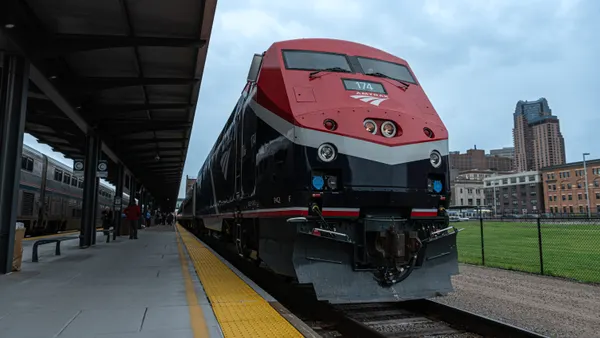The novel coronavirus pandemic (COVID-19) has prompted a slowdown in the global automotive industry, resulting in "significant challenges" that lie ahead, according to new research by Deloitte. In a report, the firm said everyone in the automotive supply chain is "feeling the pressure" of the disruptive pandemic and recovery will take time, even as local jurisdictions start to reopen.
Smart Cities Dive caught up with Joe Vitale, report co-author and Global Automotive Sector leader within Deloitte's Consumer industry, to outline four key takeaways on the future of mobility.
1. Shared mobility will recover from rider anxiety
A major concern facing city leaders is whether public transportation and other shared mobility modes will recover from the pandemic, which spurred social distancing orders and health fears that led to dramatic falls in ridership. Many public transit leaders fear that ridership will not rebound as people continue to stay away, opting instead for personal vehicles.
Despite these concerns, Vitale said there will be many consumers who return to shared transportation services in time.
"As we get to some 'new normal,' I think there will be a portion of the population that will go back to saying, 'I feel safe now getting into a shared vehicle,' and there will be a portion of the population that says, 'You know what? Owning a vehicle is not as cumbersome as I thought it was, it's not as costly as I thought it was,'" Vitale said.
Meanwhile, Vitale said for shared mobility services and transit agencies, changes forced by the coronavirus like enhanced cleaning and different payment options should stay in place, making them "more efficient, [and] more effective," meaning in time there will be better choices available beyond car ownership.
2. Congestion worries may be eased by teleworking
Fears of increased congestion in cities are building as more travelers opt to get around in personal vehicles. China, for instance, saw an uptick in car usage in some cities as residents avoided public transit following lifted stay-at-home orders.
"It doesn't take much to realize if everyone does that, we're going to have gridlock," Vitale said. He noted that the ability for more people to work remotely eliminates a need for heavy travel to a central business district during rush hours, which could help ease congestion worries.
It will take time, he said, but once recovery is underway, there will be a "self-correcting mechanism that will create the right dynamics” for traveling without too much increased congestion.
3. EV rollouts could keep the US competitive
A major tenet of the country's economic recovery is rebuilding its infrastructure, with many leaders pushing for the accelerated adoption of electric vehicles (EVs). While proposals have been floated in Congress in a bid to encourage more charging infrastructure and alternative fueling, Vitale said it remains to be seen if the U.S. will be supportive of a move away from the internal combustion engine.
If not, Vitale said, the country risks falling behind China and Europe in EV rollout, as he said they will be "very aggressive" in adopting the technology.
"What's not clear is whether the U.S. government will both adopt policies and incentives to support that transition, and if they don't, then I think the U.S. will lag behind other major developed countries in the adoption of EVs and the infrastructure necessary to support that, which will have an impact on the ability to keep pace with the rest of the world," he said.
4. Consumers will pay for safety features on new cars
The deployment and growth of autonomous vehicle (AV) usage continues to be a major question mark over the future of cities, but the pandemic sparked some creative uses of the technology. In Jacksonville, FL, the local transportation authority partnered with autonomous mobility companies Beep and NAVYA to transport COVID-19 tests in AVs, demonstrating how such vehicles can be used to move goods instead of people.
While the promise of AVs is exciting, Vitale said we still have a "long way to go" before fully autonomous cars are on the streets. Instead, consumers will continue to pay for technology that enhances safety like advanced driver-assistance systems (ADAS).
He noted that will “ultimately will lead to autonomous driving" after some time.
To keep up with all of our coverage on how the new coronavirus is impacting U.S. cities, visit our daily tracker.












